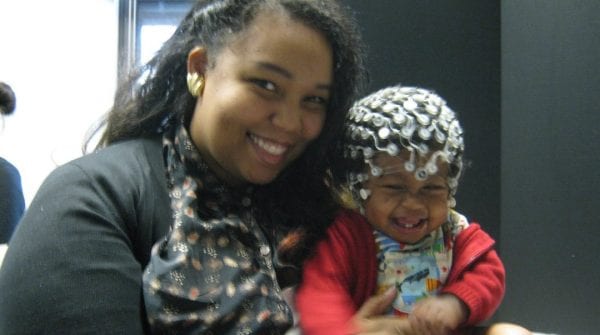Social Cognitive Function of the Motor System
How do infants make sense of the actions of others?

Courtney Filippi
Doctoral Student
What brain systems are involved in action understanding and how do these brain systems develop?
In one line of studies, we examine the type of information that infants use to make predictions about the actions of others. In these studies, infants observe videos of a person reaching for objects on an eye-tracking computer monitor. Sometimes the infant observes a person using an appropriate handshape to grip the object, other times the handshape is incorrect for the object shown. We’re interested in whether infants recruit their own knowledge about how to reach for objects and how much attention infants pay to information about how you move your hands.
 How does the motor system inform developments in social cognition?
How does the motor system inform developments in social cognition?
A second line of studies, investigates the brain networks involved in understanding the actions of others. Research has shown that the motor system, the part of the brain that we activate when we perform actions ourselves, is also active when we watch other people perform actions. Recruiting the motor system when observing actions is thought to be involved in action understanding. However, there are still many questions about how this brain network might function when motor skill and the social cognitive abilities are first developing. In a recent study, we showed that the more infants recruit this brain system, the more likely they are to imitate others’ actions. This provides a link between the brain’s motor system and infant social behavior in the first year of life. We’re currently investigating whether this brain system is linked to other social behaviors in 9- to 10-month-old infants. Together these studies will help us understand the role that the motor system plays in early social cognition.
Publications:
- Filippi, C., Cannon, E.N., Fox, N., Thorpe, S., Ferrari, P., Woodward, A. (under review). Neural mirroring predicts goal analysis in 7-month-old infants.
- Filippi, C. & Woodward (2014). Mirroring and the ontogeny of social cognition In P.F. Ferrari & G. Rizzolatti (Eds.) Mirror Neurons: Twenty years after their discovery. Oxford University Press.
- Krogh-Jespersen, S., Filippi, C., & Woodward, A.L. (2014). A developmental perspective on action and social cognition. Commentary, Behvioral and Brain Sciences, 37(2), 208-209